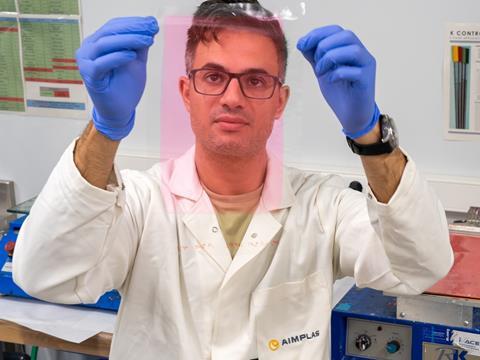
AIMPLAS is participating in the EcoeFISHent project with a vision of transforming fish gelatine and fishing nets into food and cosmetic packaging, respectively.
Global production from fisheries will reach 194 million tonnes by 2026, according to recent predictions, and around 20 million tonnes of raw material are thought to be used to produce fishmeal and fish oil. AIMPLAS believes that extracting bioactive compounds from residual, bio-based fish side streams is a cost-effective means of pursuing circularity in the fish industry.
The EcoeFISHent project is a European project seeking to preserve marine ecosystems and marine protected areas by streamlining the fish industry’s operational flows and establishing a regional reproducible cluster based on the bio, blue, green, and circular economy approaches.
This involves six multilevel and synergic circular value chains valourizing waste, pre-treating and extracting bio-active components, and recycling end-of-life fishing gear from fisheries and aquaculture for use in packaging, food, automotive, and agricultural applications.
It is set to use gelatine from side streams of fish processing to produce a compostable, gas-barrier biopolymer coating to package oxidation-sensitive food like meat, cheese, and fish itself. In scaling up to industrial pilot production, the process is hoped to achieve true sustainability while also offering functionality and ‘nonharmful utility’.
Moreover, AIMPLAS will extrude the polyethylene recovered from fishing nets and put it through further injection moulding and lamination processes to create cosmetic packaging. A collection, recovery, and recycling programme for abandoned fishing nets, as well as a sustainability-minded fishing programme, hope to contribute towards this goal.
International research centres and up-and-coming technologies and processes are coming together between thirty-four partners in seven countries. The initiative is coordinated by FILSE spa, the Financial body for Economic Development of the Ligurian regional administration, and funded by the European Union’s Horizon 2020 research and innovation programme under grant agreement ID 101036428.
Last year, Wood and CuanTec came together to develop separation facilities capable of processing shellfish to extract chitin for use in the pharmaceutical, cosmetics, and food industries.
Tesco has also teamed up with Keep Sea Blue with the intention of keeping 500 tonnes of discarded plastic out of the ocean by implementing recycled plastics into its fresh fish packaging.
If you liked this article, you might also enjoy:
The L’Oréal approach to packaging sustainability
What steps is Apple taking to make its packaging more sustainable?
How did Brazil achieve its 100% aluminium can recycling rate – and can it be replicated in the EU?
Experts have their say on the EU’s Packaging and Packaging Waste Directive revisions
Also, if you’re interested in packaging sustainability, you will want to attend our Sustainable Packaging Summit in Amsterdam on 14-15 November. The Summit brings together leaders and pioneers from across the industry to align strategically, learn, network, and create a critical mass to accelerate change. You can learn more by clicking here, and you can buy a ticket to attend here.













No comments yet